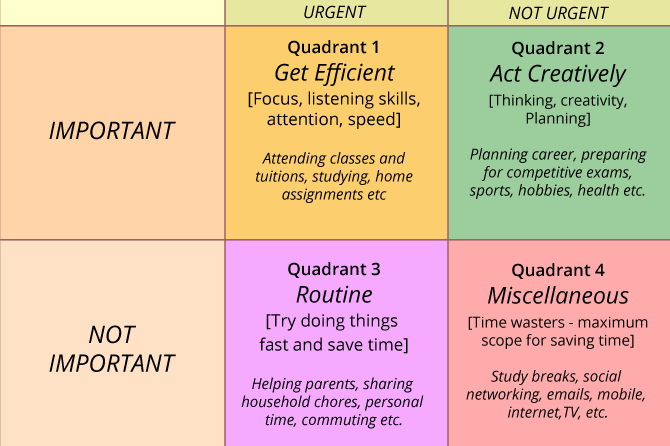As a student, do you end up preparing for your examinations at the very last minute? Do you often miss your project submission deadlines and wish you had started earlier? Do you bunk tuition or classes to make time for other activities?
Do you fail to utilise your weekend productively? If the answer is yes, then you certainly need to learn the skills of time management.
Get organised
Peter Drucker, Father of Modern Management, said:
“Until we learn how to manage time, we can manage nothing else.” The essence of time management is in performing all your activities more efficiently using lesser time. Consequently, you get more organised and focused, which reduces stress.
You can now use your spare time on activities for which you never had time earlier. This makes life more interesting and satisfying than ever before.
Power of planning
Time management requires clever planning. Use the following pointers to create a smart plan guide.
- List all the activities for a week and classify them in a time management grid according to degree of importance and urgency.
- List the activities which you want to pursue in your spare time, like hobbies or activities which enhance your personality.
- Closely examine activities classified into different quadrants.
- Quadrant 4: This quadrant has activities which are neither urgent nor important. So get smart and minimise these activities.
- Quadrant 3: This quadrant has unavoidable routine activities. Learn to complete them fast, to create a block of spare time.
- Quadrant 2: This quadrant pertains to important activities related to your career and personal wellbeing. Spend maximum time here, balancing career, health and physical activities.
- Quadrant 1: This quadrant has urgent and important activities such as classes, tuitions, assignments etc. Get efficient by being attentive and focused in class. This enhances your understanding and hence you will be better prepared for the examinations.
- Place the new plan on your desk as a constant reminder. Periodically review it and make appropriate changes.

Tips for success
- Set goals pertaining to education, professional courses and career, based on your interests and skills. The goals should be challenging but attainable.
- Make a schedule for those activities required to achieve career goals such as tuitions for competitive exams or personality development workshops.
- List all current and new activities you would like to pursue, subject to the availability of time.
- Classify all your current activities into different quadrants: Urgent & Important, Not Urgent But Important, Urgent & Not Important, and Neither Urgent Nor Important.
- Evaluate activities in each of the quadrants and find ways to eliminate activities in Quadrant 4 and save time on activities in Quadrant 3.
- Pay attention during class. This enhances your retention power and ability to recollect.
- Make a ‘to-do’ list daily and ensure that it is completed. More importantly, avoid getting into the comfort zone of postponing activities, which can turn into a nasty habit. Be punctual and disciplined even in your personal life.
- Handle difficult subjects like mathematics or a case study when your efficiency is at its peak.
- Reduce stress in examinations by jotting down points while revising.
- Activities like note-taking or preparing a presentation can be done on a single day, with due focus.
Michael Altshuler, the well-known motivational speaker, expresses the gist of time management in these words. “The bad news is that time flies. The good news is you’re the pilot.”
Time stays long enough for those who know how to use it. You wake up every morning and receive 24 hours of your life, just as anyone else. Manage time for activities which you are passionate about, like sports and hobbies, without compromising on your assignments or lessons.
Top 5 ‘time wasters’
- Social networking sites: Be there, if you want to be, but in moderation. Saves time.
- Mobile: Avoid excessive talking n messaging. Saves time and pocket money.
- Emails: Check mails at an appropriate frequency and not compulsively. Saves time.
- Window shopping: Visit malls, only when you have to shop or eat. Saves time and pocket money.
- Movies: Check reviews and watch good movies of any genre of your choice. Saves time and pocket money.

